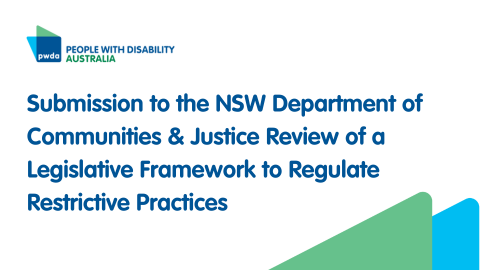
Submission to the NSW Department of Communities & Justice Review of a Legislative Framework to Regulate Restrictive Practices
February 2025
PWDA position on Restrictive Practices
PWDA sees restrictive practices as a form of legalised institutional violence that is applied in a disproportionate and discriminatory way against people with disability.
PWDA is disappointed that the Disability Royal Commission (DRC) did not recommend the elimination of all restrictive practices despite significant research available to them to assist in the development of a pathway to elimination.
While PWDA is supportive in principle of DRC Recommendation 6.36 to immediately end certain forms of restrictive practices and DRC Recommendation 6.35 to impose stricter principles and controls on the authorisation and use of restrictive practices, PWDA believes that the goal should be to eliminate rather than reduce all forms of restrictive practice. Support for DRC Recommendation 6.35 is based on a clear pathway to elimination being developed and progressing.
PWDA is concerned with the significant reported increase in the use of unauthorised restrictive practices.
PWDA believes that a strategy to reduce and eliminate the use of restrictive practices must be based on a holistic understanding of the factors that drive someone's behaviour. In this context PWDA see what are referred to often in literature and policy as 'behaviours of concern' as one legitimate response by a person with disability to a difficult situation. Supports need to be provided to the person with disability to empower them to navigate contexts safely in a way that is protective of their inherent autonomy and dignity.
Key overarching recommendations/principles
Principle of Full Elimination
There must be clear indication in the legislation and related materials of how the use of restrictive practices is to be reduced and a pathway to full elimination realised.
Principle of Co-design
People with disability must be included in a genuine co-design process in the drafting and review of all legislation, regulations, rules and policies regarding restrictive practices.
Specific recommendations based on Consultation Paper
Recommendation 1 - Rights, Consent, Support
The Australian Government and National Disability Insurance Agency should return to a flexible, principles-based, person-centred framework that enables supports to be assessed in the context of a participant's goals, functional capacity, and individual circumstances.
- The legislative framework for restrictive practices, must include:
a. A recognition that human rights including those identified in the Convention on the Rights of Person with Disabilities (CRPD) and the Convention on the Rights of the Child (CRC) must guide all decision-making.
b. A clear pathway to the elimination of restrictive practices.
c. A statement recognising the importance of consent and that it must form part of any decision-making for the authorisation of restrictive practices in NSW.
d. A recognition that the government has an obligation to ensure that support, including supported decision-making must be provided for people with disability to assist them in identifying and making their will and preferences clear in all decisions affecting them.
Recommendation 2 - Independence and people with disability in management and advisory roles
- The independent status of the Senior Practitioner must be clarified.
- The office of the Senior Practitioner must include people with disability in key management and advisory positions to ensure that decisions are made with and not for people with disability.
Recommendation 3 - Supported decision-making
- The overarching importance of providing supported decision-making prior to a restrictive practice being authorised (and at other points through the process including assisting in review) must be identified and made explicit in the legislation, and not just left as part of a wider principle. Access to supported decision-making, as a driver of elimination, must be recognised in the legislation as a right as identified in article 12 of the Convention on the Rights of Persons with Disabilities (CRPD).
Recommendation 4 - Scope of legislation (settings)
- A specific restrictive practices legislative framework to regulate restrictive practices in NSW must be developed now to cover all those subject to restrictive practices regardless of setting (this includes health, mental health, education, justice, OOHC, and aged care), regardless of whether they are a NDIS participant, and regardless of existing policies and regulations.
Recommendation 5 - Scope of Senior Practitioner (authorisation)
- If a Senior Practitioner model in the legislative framework is to be adopted then they must authorise or oversee all restrictive practices, not just those used in the provision of NDIS funded services by NDIS providers. This must be included now in legislation, in line with the views of Disability Royal Commission (DRC) Recommendation 6.35(a), and the necessity of this as expressed by the DRC in its Final Report.
Recommendation 6 - Scope of Senior Practitioner (review)
- If a Senior Practitioner model in the legislative framework is to be adopted, then review and reporting processes under their office must be available to all persons affected by restrictive practices, not just NDIS participants.
- The Senior Practitioner must provide all necessary assistance and support, including supported decision-making, to assist an impacted person to seek review of a decision. This right to request support, including supported decision-making, must be made clear in the legislation.
This submission has been endorsed by the following organisations:
Children and Young People with Disability Australia






